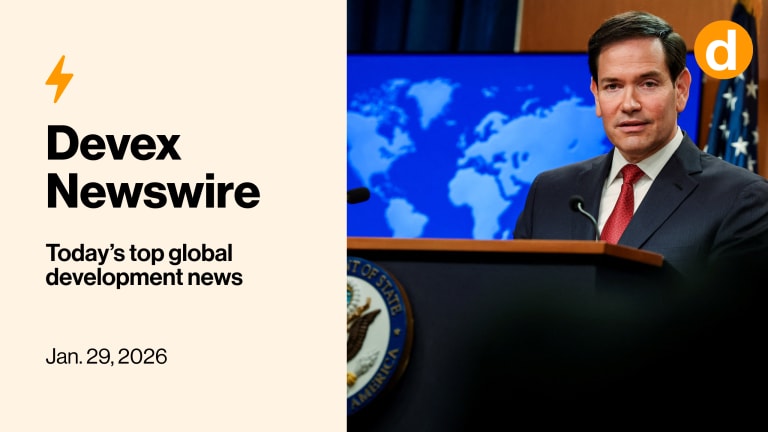
The World Food Programme is paying $71 million more per month to deliver food aid due to a combination of inflation and the Russian invasion of Ukraine.
+Join us: Women’s rights are integral to achieving the SDGs, but there are specific challenges to funding feminist movements. On March 23 at 9 a.m. ET (2 p.m. CET), Devex philanthropy reporter Stephanie Beasley, along with a group of experts in the field, will discuss how organizations and donors can engage most effectively. Save your spot.
This is a preview of Newswire
Sign up to this newsletter for an inside look at the biggest stories in global development, in your inbox daily.
The steep increase in monthly operational costs for WFP includes a $42 million price hike due to inflation, plus another $29 million resulting from the war in Ukraine. That comes alongside a 60% funding shortfall for the organization’s projected needs over the next six months, Shabtai Gold reports.
Russia and Ukraine are both major food commodity suppliers for WFP — together accounting for nearly 30% of global wheat exports — and U.N. agencies are trying to purchase as much food from Ukraine’s markets as they can. A USAID official also told me that they see local procurement of food aid as key whenever it is possible. But now instead of planting crops, many Ukrainian farmers have taken up arms to defend their country.
“The ripple effect of Ukraine is going to be substantial,” says WFP Executive Director David Beasley.
Your move, Elon Musk.
Read: WFP costs up 50% since 2019, with Ukraine set to make matters worse
WFP is hardly the only food purchaser feeling a serious pinch. Rising food prices take the biggest toll on people in lower-income countries who spend a greater percentage of their money on food.
In a blog post, analysts at the International Monetary Fund suggest a few possible policy options to offset food supply shortages: avoiding protectionism, increasing social assistance, diverting American corn away from ethanol, and calling on China to release its wheat and corn reserves.

+ For the inside track on how agriculture, nutrition, sustainability, and more intersect to remake the global food system, sign up for Devex Dish, our free, must-read Wednesday newsletter.
Yes, chef
“There is a tendency of people to freeze in adversity. We must start empowering people to embrace complexity, embrace when something doesn’t go as planned, and learn to adapt.”
— Jose Andres, celebrity chef and founder of World Central KitchenAndres, who was the guest on a Ukraine response conference call organized by Refugee Investment Network, says aid organizations should give employees on the ground more decision-making authority, so they can adapt as conditions change rather than wait for orders from the top. World Central Kitchen has set up more than 300 food distribution sites in Ukraine and neighboring countries.
+ Devex Pro subscribers can learn more about how other organizations with little to no experience in Ukraine and Eastern Europe are scrambling to respond to the crisis. Not gone Pro yet? Start your 15-day free trial.
Finding peace
The U.S. State Department has created a new unit of on-demand peacekeeping advisers who can provide diplomats and other U.S. government officials expertise on negotiating and implementing peace processes, Teresa Welsh reports.
Teresa writes that the Negotiations Support Unit “will act as an internal consultancy for the State Department on both the process and substance of peace negotiations, from strategic planning through implementation. It will also be available outside the department to agencies such as the U.S. Agency for International Development and the Department of Defense.”
The new support unit could play a role in helping to overhaul the U.S. strategy to prevent conflict, an update required by the 2019 Global Fragility Act.
And speaking of the Global Fragility Act, Teresa tells me that we may possibly finally get a list of countries or regions where the highly touted — and perennially delayed — new approach to conflict prevention in fragile countries will be implemented. But keep in mind, we’ve heard this before.
Today, U.S. Secretary of State Antony Blinken is expected to announce the Biden administration’s formal determination that violence committed by Myanmar’s military against the Rohingya amounts to genocide and crimes against humanity.
Help wanted
My colleague Justin Sablich has been keeping a close eye on organizations that are hiring in response to the humanitarian crisis in Ukraine — and he recently updated his list of hiring organizations. After a pause in February as Russia massed troops along Ukraine’s border, the number of open positions has recently increased alongside major funding packages for the United Nations and its implementing partners.
Ukraine jobs update: The globaldev organizations hiring in response to Ukraine crisis
In other news
Five countries in Africa will hold polio vaccination campaigns following an outbreak of the virus in Malawi last month. [New York Times]
Two-thirds of Sri Lanka’s students may have school tests postponed due to a paper shortage amid a financial crisis. [Al Jazeera]
The African Development Bank secured $32.8 billion for projects in the continent at a three-day investment forum last week. [Reuters]
Sign up to Newswire for an inside look at the biggest stories in global development.








